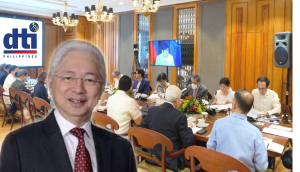 Department of Trade and Industry (DTI) new Secretary Alfredo E. Pascual presented the DTI’s ten strategic priorities during the second cabinet meeting on 12 July 2022, presided by President Ferdinand “Bongbong” Romualdez Marcos, Jr.
Department of Trade and Industry (DTI) new Secretary Alfredo E. Pascual presented the DTI’s ten strategic priorities during the second cabinet meeting on 12 July 2022, presided by President Ferdinand “Bongbong” Romualdez Marcos, Jr.
Among the strategic priorities is the reconfiguration of the export sector into industry clusters, with a focus on the following: (1) Industrial, Manufacturing, and Transport (IMT) which encompasses aerospace (aircraft interiors; maintenance, repair, and overhaul), automotive (electric vehicles), semiconductors; (2) Technology, Media, and Telecommunication (TMT), that covers digitalization services, IT-BPM, artificial intelligence and data analytics, cybersecurity, hyper-scale data centers, creative industries; (3) and Health and Life Science (HLS), for biopharmaceuticals, pharmaceuticals, medical devices, and healthcare services. Continue reading DTI reconfigures export sectors into Industry Clusters

 In line with the full implementation of CMO 20-2021 and AOCG Memo No. 199-2022, Assessment and Operations Coordinating Group Deputy Commissioner Edward James Dy Buco issued AOCG Memo 229-2022, directing all Collection districts and offices concerned to the full implementation of the Automated Inventory Management System (AIMS) as it will go live on 18 July 2022.
In line with the full implementation of CMO 20-2021 and AOCG Memo No. 199-2022, Assessment and Operations Coordinating Group Deputy Commissioner Edward James Dy Buco issued AOCG Memo 229-2022, directing all Collection districts and offices concerned to the full implementation of the Automated Inventory Management System (AIMS) as it will go live on 18 July 2022. Royal Cargo announces IRIS Paoay’s shift of US voyage to intra-Asia service, calling from the Philippines to Thailand and VietNam.
Royal Cargo announces IRIS Paoay’s shift of US voyage to intra-Asia service, calling from the Philippines to Thailand and VietNam. President Ferdinand “Bongbong” Marcos, Jr. (PBBM) vetoed bills institutionalizing the Philippine Transportation Safety Board (PTSB).
President Ferdinand “Bongbong” Marcos, Jr. (PBBM) vetoed bills institutionalizing the Philippine Transportation Safety Board (PTSB). President Ferdinand “Bongbong” Romualdez Marcos, Jr., (PBBM) in his State of the Nation Address (SONA) 2022 urged to boost the Tourism Industry as a driver to economic recovery through basic developments in the existing infrastructure in coordination with the Department of Tourism and Department of Public Works and Highways.
President Ferdinand “Bongbong” Romualdez Marcos, Jr., (PBBM) in his State of the Nation Address (SONA) 2022 urged to boost the Tourism Industry as a driver to economic recovery through basic developments in the existing infrastructure in coordination with the Department of Tourism and Department of Public Works and Highways.  To help the economy recover, the Land Transportation Franchising and Regulatory Board (LTFRB) requests the cooperation of the truckers and ports as the Unified Logistics Pass (ULP) kicks off its implementation.
To help the economy recover, the Land Transportation Franchising and Regulatory Board (LTFRB) requests the cooperation of the truckers and ports as the Unified Logistics Pass (ULP) kicks off its implementation.
 The United Portusers Confederation, Inc. (UPC), a group of transport and logistics associations, bares its goals on day 2 of the 2022 Ports and Shipping Conference.
The United Portusers Confederation, Inc. (UPC), a group of transport and logistics associations, bares its goals on day 2 of the 2022 Ports and Shipping Conference. The Bangko Sentral ng Pilipinas (BSP) has expanded QR Ph, the country’s QR code standard, to enable person-to-merchant (P2M) payments to boost the digitalization of small businesses. The use of QR codes for payments has been gaining traction as an alternative to cash or traditional debit and credit card payments. In November 2019, the payment industry participants led by the Philippine Payments Management, Inc. (PPMI), under the guidance of the Bangko Sentral ng Pilipinas (BSP), launched the “QR Ph”, as the National QR Code standard.
The Bangko Sentral ng Pilipinas (BSP) has expanded QR Ph, the country’s QR code standard, to enable person-to-merchant (P2M) payments to boost the digitalization of small businesses. The use of QR codes for payments has been gaining traction as an alternative to cash or traditional debit and credit card payments. In November 2019, the payment industry participants led by the Philippine Payments Management, Inc. (PPMI), under the guidance of the Bangko Sentral ng Pilipinas (BSP), launched the “QR Ph”, as the National QR Code standard.